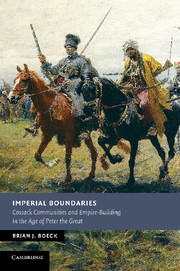Book contents
- Frontmatter
- Contents
- List of maps and illustrations
- Acknowledgments
- List of abbreviations
- 1 The Don region
- 2 The wider world of the Don steppe frontier
- Introduction
- 1 Beyond borders, between worlds: Russian Empire and the making of the Don steppe frontier
- 2 People and power on the frontier: liberty, diversity, and de-centralization in the Don region to 1700
- 3 A middle ground between autonomy and dependence: the raiding economy of the Don steppe frontier to 1700
- 4 Boundaries of integration or exclusion? Migration, mobility, and state sovereignty on the southern frontier to 1700
- 5 Testing the boundaries of imperial alliance: cooperation, negotiation and resistance in the era of Razin (1667–1681)
- 6 Between Rus' and Rossiia: realigning the boundaries of Cossack communities in a time of migration and transition (1681–1695)
- 7 The era of raskol: religion and rebellion (1681–1695)
- 8 Incorporation without integration: the Azov interlude (1695–1711)
- 9 From frontier to borderland: the demarcation of the steppe and the delegitimization of raiding (1696–1710)
- 10 Boundaries of land, liberty, and identity: making the Don region legible to imperial officials (1696–1706)
- 11 The Bulavin uprising: the last stand of the old steppe (1706–1709)
- 12 Reshaping the Don in the imperial image: power, privilege, and patronage in the post-Bulavin era (1708–1739)
- 13 Closing the Cossack community: recording and policing the boundaries of group identity (1708–1739)
- 14 A borderline state of mind: the closing of the Don steppe frontier (1708–1739)
- Afterword
- Index
- References
2 - People and power on the frontier: liberty, diversity, and de-centralization in the Don region to 1700
Published online by Cambridge University Press: 12 January 2010
- Frontmatter
- Contents
- List of maps and illustrations
- Acknowledgments
- List of abbreviations
- 1 The Don region
- 2 The wider world of the Don steppe frontier
- Introduction
- 1 Beyond borders, between worlds: Russian Empire and the making of the Don steppe frontier
- 2 People and power on the frontier: liberty, diversity, and de-centralization in the Don region to 1700
- 3 A middle ground between autonomy and dependence: the raiding economy of the Don steppe frontier to 1700
- 4 Boundaries of integration or exclusion? Migration, mobility, and state sovereignty on the southern frontier to 1700
- 5 Testing the boundaries of imperial alliance: cooperation, negotiation and resistance in the era of Razin (1667–1681)
- 6 Between Rus' and Rossiia: realigning the boundaries of Cossack communities in a time of migration and transition (1681–1695)
- 7 The era of raskol: religion and rebellion (1681–1695)
- 8 Incorporation without integration: the Azov interlude (1695–1711)
- 9 From frontier to borderland: the demarcation of the steppe and the delegitimization of raiding (1696–1710)
- 10 Boundaries of land, liberty, and identity: making the Don region legible to imperial officials (1696–1706)
- 11 The Bulavin uprising: the last stand of the old steppe (1706–1709)
- 12 Reshaping the Don in the imperial image: power, privilege, and patronage in the post-Bulavin era (1708–1739)
- 13 Closing the Cossack community: recording and policing the boundaries of group identity (1708–1739)
- 14 A borderline state of mind: the closing of the Don steppe frontier (1708–1739)
- Afterword
- Index
- References
Summary
Like the pirates, buccaneers, and marroons that emerged on the margins of European colonial societies in the early modern period, the Don Cossacks created community out of diversity and constructed a new polity in interstitial space between empires. Among the Cossacks outcasts and outlaws could seek liberty. For those returning from Tatar captivity the region served as a halfway house between bondage and new identities. Diversity and decentralization dominated the political and social world of the Don Cossacks.
Most historians have tended to simply view the Don Cossacks as a peculiar group of Russians, consigning the hybrid nature of early Cossack society to the margins of discussions of Cossack identity. In contrast, this study emphasizes that Don Cossacks created a new society, a socio-cultural fusion comprised of diverse elements, but committed to an anti-bureaucratic and egalitarian political system. Early Cossack identity was not defined by common language or common origins, but by common interest.
LIBERTY AND AUTOCRACY
Both Cossack and Russian observers agree that volia, translated here as liberty, was a predominant feature of life in the Don, but what did the term mean in a seventeenth-century context? The term itself has connotations of liberty, lack of restraint, and unencumbered actions according to one's own will. For Russian observers it likely meant the antithesis of the Muscovite value system in which autocracy, bureaucracy, legally protected honor, inherited social status, and an emerging institution of social and migration control, usually labeled serfdom, predominated.
- Type
- Chapter
- Information
- Imperial BoundariesCossack Communities and Empire-Building in the Age of Peter the Great, pp. 27 - 39Publisher: Cambridge University PressPrint publication year: 2009



